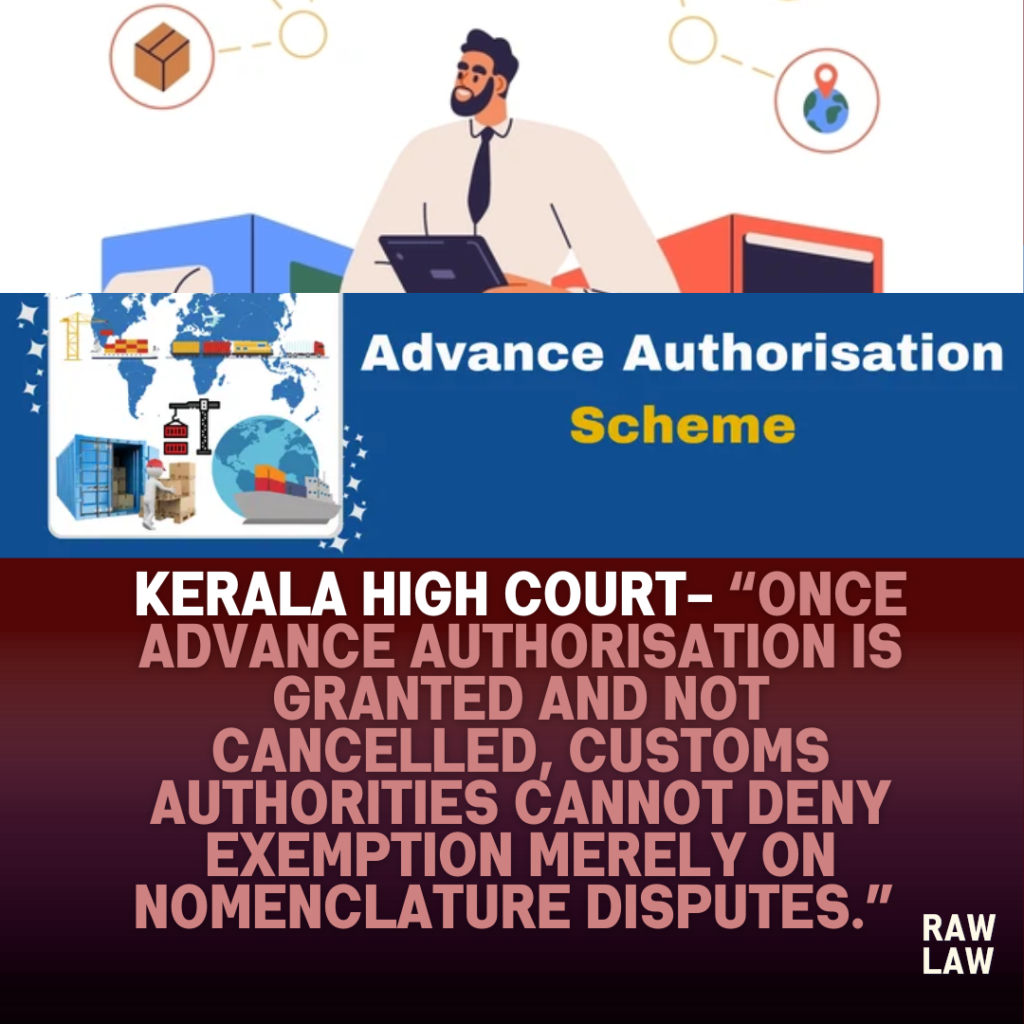Court’s Decision
The Kerala High Court allowed the appeal by Nitta Gelatin India Limited, setting aside the Customs Department’s demand for differential duty on imports under advance authorisation, while dismissing the Revenue’s appeal seeking imposition of duty, fine and penalty on past consignments. The Court held that once advance authorisation is valid and not cancelled by DGFT, the Customs Department cannot deny exemption merely because of alleged misdescription of imported goods, provided the goods remain the same in substance.
Facts
Nitta Gelatin India Limited imported decalcified fish scales under the advance authorisation scheme for manufacturing collagen peptides for export, describing the goods initially as “fish protein.” During inspections, Customs authorities classified the imports as “decalcified fish scales,” alleging misdescription and demanding differential duty, fines, and penalties on the ground that the product description in documents differed. The Revenue alleged that exemption under Notification No. 96/2009-Cus was wrongly availed. The Customs Tribunal partially allowed the department’s demand concerning live consignments under provisional assessment while setting aside the demand and penalties on past consignments. Both Nitta Gelatin and the Customs Department filed cross-appeals challenging this decision.
Issues
- Whether describing “decalcified fish scales” as “fish protein” under advance authorisation invalidates exemption under Customs Notification No. 96/2009-Cus.
- Whether the Customs Department can demand differential duty despite valid advance authorisation from DGFT.
- Whether the Tribunal was correct in allowing and disallowing the demand partially on past and live consignments.
Petitioner’s Arguments
Nitta Gelatin argued that:
- The substance of the imported goods remained the same; only nomenclature differed.
- Under the Foreign Trade Policy and Advance Authorisation Scheme, goods are exempt from duty if used for export production, irrespective of minor description variations.
- There was no misrepresentation or violation of authorisation conditions, and the DGFT did not cancel the advance authorisation.
- They relied on Titan Medical Systems Pvt. Ltd. v. Collector of Customs, which held that Customs cannot deny exemption when DGFT does not allege misrepresentation.
Respondent’s Arguments
The Customs Department argued that:
- The goods were misdeclared, which invalidated the claim for duty exemption.
- The classification under a different heading meant duty was payable, and past consignments should also attract duty, fine, and penalties.
- Misdescription amounted to violation of the Customs Act and notification conditions, warranting denial of exemption.
Analysis of the Law
The Court examined:
- Advance Authorisation Scheme under the Foreign Trade Policy, which allows duty-free import of inputs for exports.
- Notification No. 96/2009-Cus, granting duty exemption under advance authorisation.
- Titan Medical Systems (2003) 151 ELT 254 (SC), which held that if advance authorisation is valid and not cancelled by DGFT, Customs authorities cannot deny exemption on alleged misdescription.
- The DGFT’s jurisdiction over monitoring compliance under advance authorisation.
Precedent Analysis
Titan Medical Systems Pvt. Ltd. v. Collector of Customs (SC): Customs authorities cannot deny exemption under advance authorisation where the DGFT has not alleged misrepresentation or cancelled the licence, even if there are nomenclature differences in import documentation.
Court’s Reasoning
The Court held:
- The goods imported under advance authorisation were the same across past and current consignments, only described differently.
- Classification disputes do not impact the validity of the exemption if the goods were used for export manufacturing under the advance authorisation scheme.
- The DGFT did not allege misrepresentation or cancel authorisation, and hence the Customs Department’s demand was unsustainable.
- The principles in Titan Medical Systems directly applied to the present case.
Conclusion
The Kerala High Court allowed Nitta Gelatin India’s appeal and dismissed the Customs Department’s appeal. The demand for differential duty, fine, and penalty on both past and current consignments was quashed, affirming that imports under valid advance authorisation remain duty-exempt regardless of nomenclature disputes when there is no breach or cancellation of authorisation by the DGFT.
“In the absence of cancellation by the DGFT, Customs authorities cannot refuse exemption under advance authorisation for mere description differences.” – Kerala High Court
Implications
- Clarifies that Customs exemption under advance authorisation cannot be denied on nomenclature disputes if DGFT has not objected.
- Reinforces the supremacy of DGFT’s authorisation under the Foreign Trade Policy in duty exemption disputes.
- Eases compliance for export-oriented units using advance authorisation for importing raw materials.
Referred Cases and Their Relevance
Titan Medical Systems Pvt. Ltd. v. Collector of Customs (2003): Reaffirmed that Customs cannot deny exemption under advance authorisation when DGFT does not allege misrepresentation or cancel the licence, directly applied by the High Court to support Nitta Gelatin’s case.
FAQs
- Can Customs deny duty exemption under advance authorisation if product description differs?
No. If the product remains the same in substance and the DGFT has not cancelled the authorisation, Customs cannot deny exemption merely on nomenclature differences.
- What did the Kerala High Court decide in the Nitta Gelatin case?
The Court held that Nitta Gelatin was entitled to duty exemption under advance authorisation and quashed the Customs Department’s demand for differential duty, fines, and penalties.
- Why is the Titan Medical Systems judgment important for importers under advance authorisation?
It establishes that Customs cannot deny exemption under advance authorisation if DGFT has not objected, even when alleged misrepresentation in description is claimed by Customs



